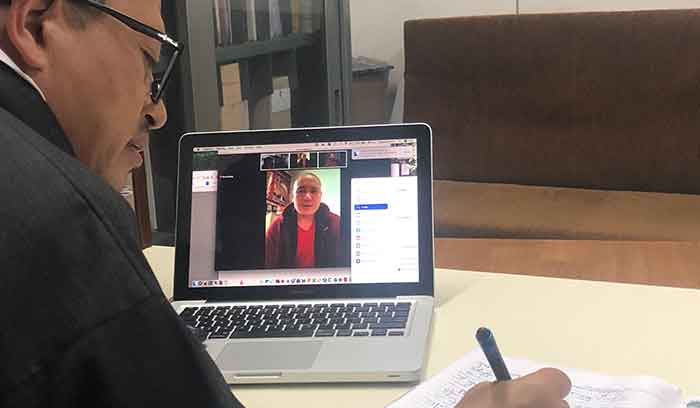A Bhutanese shares his near-death experience after getting infected
Younten Tshedup
“The unbearable pain had me begging for death on many occasions.”
After witnessing numerous bodies exiting the hospital in coffins and body bags, 47-year-old Sonam Dendup is steadily recovering from Covid-19 in New York.
The monk from Chumey, Bumthang is the third Bhutanese to have been infected in New York City. He is currently in self-isolation at his residence in Queens, New York.
After spending 18 years in Mysore, the Indian state of Karnataka, Sonam Dendup moved to the United States in 2015. For the last five years, he has been living in New York, teaching at a Buddhist centre in Queens.
The struggle
Before getting the disease, Sonam Dendup said that he did not have any health-related issues. Unsure of how he contracted the disease, he said that he started feeling ill after Losar celebrations towards the end of February.
“For two weeks, I had a discomfort in my stomach, and slowly I developed a severe headache. No medication helped,” he said. In the following days, his entire body ached. “I had severe joints and muscle pains. Then I started developing a dry cough.”
Given the strict instructions from the state authorities to avoid visiting hospitals unless it was an emergency, Sonam Dendup said that he couldn’t visit a hospital.
However, in the next few days, as he struggled to sleep at night and developed breathing discomfort, he had to call in the health emergency unit.
On March 27, Sonam was admitted at the Elmhurst hospital centre in Queens. “I was half-conscious when I arrived at the hospital. There were hundreds of people crying and shouting for help,” he said. “I was lucky to get a bed when I arrived. A person had just died, so I took his place. 12 more had died that day.”
He said that immediately upon his arrival, he was put on a ventilator. “Doctors said that my chances of recovery were limited and almost 80 percent of people put on ventilators did not make it.”
In a semi-conscious state, he spent 24 hours at the hospital before moving him to another intensive care unit (ICU) facility in Manhattan. “The pain was just unbearable. I couldn’t sleep for almost 20 days,” he said, adding that he spent the days screaming in pain and thinking he could die any moment.
Often, he used to wake up from his half slumber, wondering if he was alive.
“In our religion, we believe in sufferings, we all have to go through when we die. But those sufferings were nothing compared to the ones I was going through,” Sonam Dendup said. “On many occasions, I thought of asking the doctors to put me out of my misery, once and for all.”
However, the thought of his family suffering after his death kept him going. He said that he saw bodies being taken out in coffins and body bags immediately after a person died. “Had I died, my body would have been taken out in a similar way and incinerated somewhere in the absence of my family members.”
Besides the physical torture and insomnia, severe diarrhoea added to the excruciating pain, he said. “With no appetite for food, going to the toilet 20 times a day was challenging. And then there is no one to help you because of the limited hospital staff.”
Road to recovery
Despite the severe loss in appetite, Sonam Dendup said that he forced the food in his mouth with a hope it would help. “I did not even have the energy to chew. I didn’t feel any taste, nor could I smell anything. Still, I ate them all with the hope to recover.”
He said that a Tibetan nurse at the hospital helped in getting some extra food and warm water, which was very rare at the hospital.
Over the days he received calls from his friends and teachers at Mysore and back home who gave him the moral support to fight the disease. “All sorts of prayers and rimdro were being conducted for me, and it was actually helping too.”
After 15 days, he was discharged from the hospital. “Once I reached home, I made sure I ate nutritious food and isolated myself,” he said. “There is no magic trick to overcome this disease. It is a combination of good health facilities, medication, nutritious food, self-care and your believe in protective deities and gods.”
Missing home
At home and alone in New York, Sonam often wonders why he left Bhutan. “These are the times when you start missing your country and countrymen,” he said. “Had I been in Bhutan, I might not have got the disease, and even if I did, the treatment and care would have been much better.”
He said that when America, the leading country in the world is struggling, Bhutanese have to be extra cautious.
“Led by His Majesty The King, the government has done everything possible to prevent the diseasing from spreading,” he said. “But the efforts should not only come from the government. Every individual has to be responsible for their own safety.”
He added that he remains indebted to the support he received from the Bhutanese community in New York and the permanent mission. “At a time when people are more concerned about personal wellbeing, Bhutanese in New York and especially the task force team has been supportive.”


